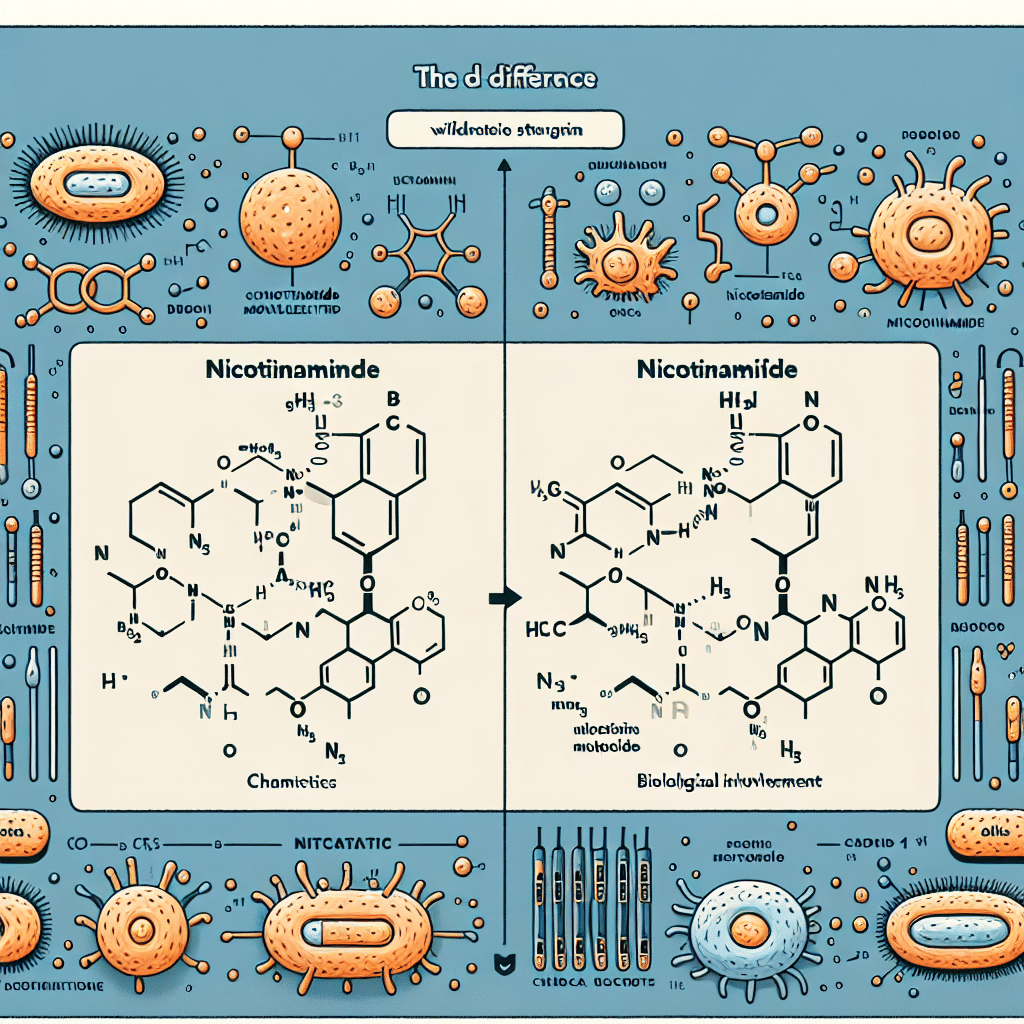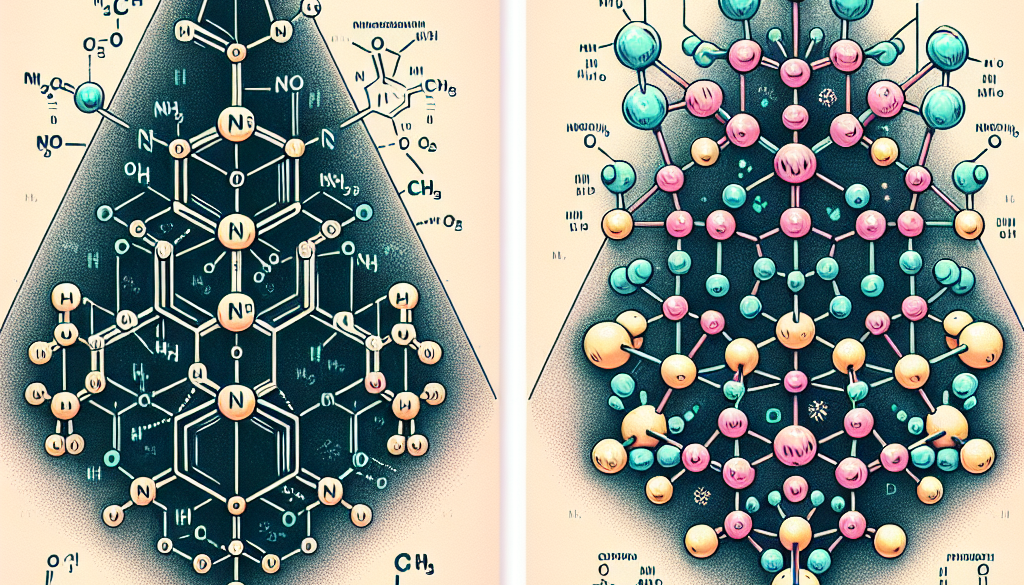Difference Between Nicotinamide and Nicotinamide Mononucleotide
-
Table of Contents
- Nicotinamide vs. Nicotinamide Mononucleotide: Understanding the Differences
- What is Nicotinamide?
- What is Nicotinamide Mononucleotide?
- Structural Differences
- Biological Functions and Pathways
- Health Benefits and Research
- Safety and Side Effects
- Conclusion: Key Takeaways
- Explore ETprotein’s High-Quality Protein Products
Nicotinamide vs. Nicotinamide Mononucleotide: Understanding the Differences

The world of nutritional supplements is vast and often confusing, with various compounds claiming to offer a range of health benefits. Among these, nicotinamide and nicotinamide mononucleotide (NMN) have gained significant attention for their roles in cellular metabolism and potential anti-aging effects. While they may sound similar, these two molecules have distinct differences in their structure, function, and implications for health. This article delves into the science behind nicotinamide and NMN, exploring their unique characteristics and the latest research findings.
What is Nicotinamide?
Nicotinamide, also known as niacinamide, is a form of vitamin B3, an essential nutrient that supports numerous enzymatic reactions and cellular processes. It plays a critical role in the production of nicotinamide adenine dinucleotide (NAD+), a vital coenzyme involved in energy metabolism, DNA repair, and cell signaling. Nicotinamide is found in various food sources, including meat, fish, nuts, and green vegetables, and is also available as a dietary supplement.
What is Nicotinamide Mononucleotide?
Nicotinamide mononucleotide (NMN) is a nucleotide derived from ribose and nicotinamide. It is a key intermediate in the biosynthesis of NAD+ and is considered a direct precursor to this essential coenzyme. NMN has gained popularity as a dietary supplement due to its potential to boost NAD+ levels in the body, which may have anti-aging and health-promoting effects. Unlike nicotinamide, NMN is not commonly found in the diet and is primarily taken in supplement form.
Structural Differences
The primary difference between nicotinamide and NMN lies in their molecular structure. Nicotinamide is a simple amide form of vitamin B3, whereas NMN is a larger molecule that includes a nicotinamide moiety attached to a ribose sugar and a phosphate group. This structural distinction is crucial as it influences how each compound is utilized and processed within the body.
Biological Functions and Pathways
Both nicotinamide and NMN are precursors to NAD+, but they participate in different pathways within the NAD+ biosynthesis process. Nicotinamide is converted into NAD+ through the salvage pathway, which recycles nicotinamide released during NAD+ consumption in cellular reactions. On the other hand, NMN is a step closer to NAD+ in the biosynthesis pathway and is converted directly into NAD+ after being phosphorylated to form nicotinamide adenine dinucleotide phosphate (NMNAT).
Health Benefits and Research
Research has shown that both nicotinamide and NMN can have positive effects on health, particularly in the context of aging and age-related diseases. Here are some of the key findings:
- Nicotinamide: Studies suggest that nicotinamide can help protect against skin damage from UV radiation, improve skin barrier function, and reduce inflammation. It has also been investigated for its potential to prevent certain neurodegenerative diseases and improve metabolic health.
- NMN: NMN has been extensively studied for its anti-aging properties. Animal studies have demonstrated that NMN supplementation can improve age-related metabolic disorders, enhance physical performance, and potentially extend lifespan. Human studies are ongoing to validate these findings.
Safety and Side Effects
Both nicotinamide and NMN are generally considered safe when taken at recommended doses. Nicotinamide is well-tolerated and has been used safely for decades as a supplement and in skincare products. NMN is relatively new to the supplement market, but early research indicates it is also safe for human consumption. However, as with any supplement, it is essential to consult with a healthcare provider before starting any new regimen.
Conclusion: Key Takeaways
In summary, while nicotinamide and nicotinamide mononucleotide are related compounds that both contribute to NAD+ biosynthesis, they are distinct in their structure and function. Nicotinamide is a form of vitamin B3 with a long history of use and a range of health benefits, particularly for skin health and metabolic function. NMN is a direct NAD+ precursor that has shown promise in anti-aging research, with potential benefits for metabolic health and longevity.
Understanding the differences between these two compounds is crucial for making informed decisions about supplementation and for appreciating the nuances of how our bodies maintain cellular health. As research continues to evolve, the potential therapeutic applications of nicotinamide and NMN will become clearer, offering exciting possibilities for health and wellness.
Explore ETprotein’s High-Quality Protein Products
If you’re looking to enhance your health regimen with high-quality protein supplements, consider exploring ETprotein’s range of products. ETprotein is a reputable manufacturer and supplier of organic bulk vegan proteins and L-(+)-Ergothioneine (EGT), offering a variety of protein options to suit your needs.
ETprotein’s offerings include Organic rice protein, clear rice protein, pea protein, clear pea protein, watermelon seed protein, pumpkin seed protein, sunflower seed protein, mung bean protein, peanut protein, and L-(+)-Ergothioneine EGT in various grades. These products are characterized by their neutral taste, non-GMO, allergen-free attributes, and high purity levels, making them ideal for a range of industries, including nutraceuticals, pharmaceuticals, cosmeceuticals, and food and beverage.
For more information or to sample ETprotein’s products, please contact them at sales(at)ETprotein.com today.
About ETprotein:
ETprotein, a reputable protein and L-(+)-Ergothioneine (EGT) Chinese factory manufacturer and supplier, is renowned for producing, stocking, exporting, and delivering the highest quality organic bulk vegan proteins and L-(+)-Ergothioneine. They include Organic rice protein, clear rice protein, pea protein, clear pea protein, watermelon seed protein, pumpkin seed protein, sunflower seed protein, mung bean protein, peanut protein, and L-(+)-Ergothioneine EGT Pharmaceutical grade, L-(+)-Ergothioneine EGT food grade, L-(+)-Ergothioneine EGT cosmetic grade, L-(+)-Ergothioneine EGT reference grade and L-(+)-Ergothioneine EGT standard. Their offerings, characterized by a neutral taste, non-GMO, allergen-free attributes, with L-(+)-Ergothioneine purity over 98%, 99%, cater to a diverse range of industries. They serve nutraceutical, pharmaceutical, cosmeceutical, veterinary, as well as food and beverage finished product distributors, traders, and manufacturers across Europe, USA, Canada, Australia, Thailand, Japan, Korea, Brazil, and Chile, among others.
ETprotein specialization includes exporting and delivering tailor-made protein powder and finished nutritional supplements. Their extensive product range covers sectors like Food and Beverage, Sports Nutrition, Weight Management, Dietary Supplements, Health and Wellness Products, and Infant Formula, ensuring comprehensive solutions to meet all your protein needs.
As a trusted company by leading global food and beverage brands and Fortune 500 companies, ETprotein reinforces China’s reputation in the global arena. For more information or to sample their products, please contact them and email sales(at)ETprotein.com today.












